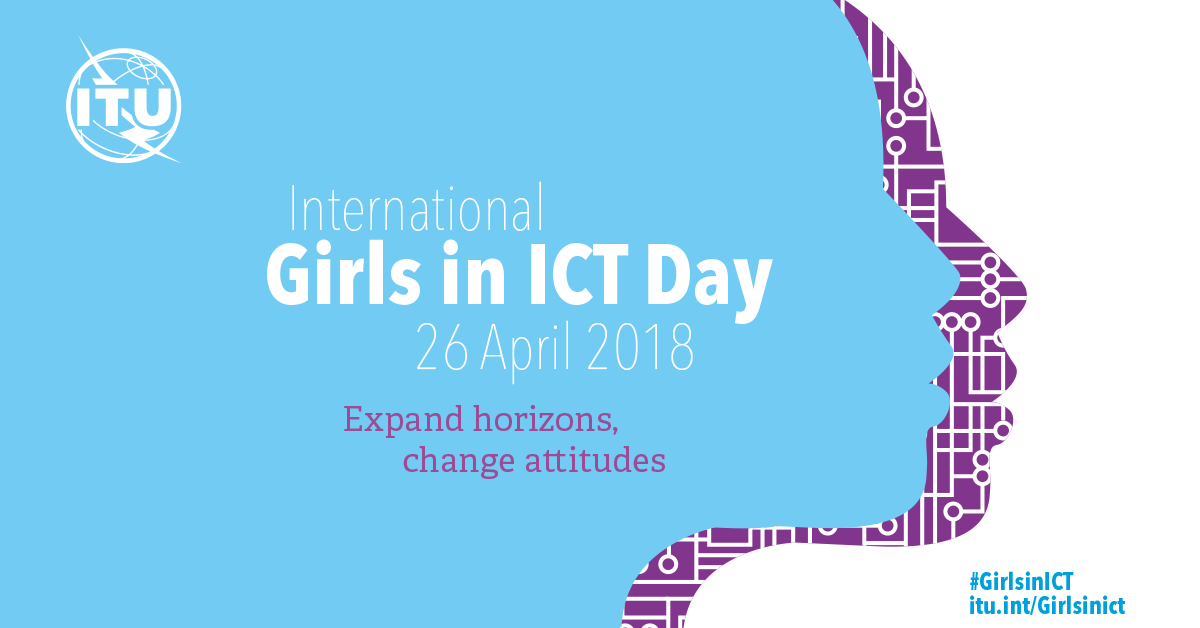Girls and young women have the potential not only to become ICT users but also to become ICT creators. Let’s invite girls to explore career opportunities in the ICT industry. Let’s spark their interest in ICT and make International Girls in ICT Day successful!
Context
International Girls in ICT Day, an initiative backed by all International Telecommunication Union (ITU) the Member States is being celebrated across the globe today. Girls in ICT Day is a global effort to encourage girls and young women to consider studies and careers in the ICT industry.
According to a recent ITU report, the percentage of women in computing jobs has been declining since 1991, when women held 36 percent of these jobs. As of 2015, they held only 25 percent of all computing jobs.
With the number of school girls opting to study technology-related disciplines in decline in most countries worldwide, International Girls in ICT Day is being celebrated to play the catalytic role in creating exciting, far-reaching opportunities for women and girls.
International Girls in ICT Day is celebrated since 2011 every year, on the last Thursday of April, in 160+ countries worldwide. This year, the day is being celebrated with the slogan ‘Expand horizons, change attitudes.
Technology is the future. Every girl and every woman has huge potential. Why not learn about technology if they want to? In the end, we are all equal. Let’s encourage and empower young women to explore career opportunities in the science, technology, engineering and mathematics (STEM) areas.
Why it matters in Nepal?
In the context of Nepal, not enough students are preparing themselves for studies in math, engineering, computing, and sciences. Compounding this problem, the number of female technical students is disproportionately low, and the ICT industry is currently male-dominated.
Fortunately, many companies are looking to increase the number of women in the sector. The future success of the ICT industry rests on the ability to attract talented females and inspire a new generation of young women to become tomorrow’s industry leaders.
In Nepal, we have seen women become President, Speaker of Parliament, and Chief Justice. For the first time, Kamini Rajbhandari became the Managing Director of Nepal Telecom. Likewise, we have started to see the rise of female CEOs in banks and corporate houses. This should encourage more girls to choose IT career.
Independent girl organizations like Women Leaders in Technology, Women in STEM Nepal, Girls In Technology, and Butwal Coder Girls are actively working to encourage girls’ involvement in the ICT sector.
Hackathons and various other activities are being organized across different cities to celebrate Girls In ICT Day 2018 in Nepal. Furthermore, Nepal Telecommunication Authority has launched a portal to mark the day.
What is Khalti doing?
While the entire country is talking about economic revolution and smart cities, no one is thinking that it is impossible without the participation of 51% of the females that our country has. There is a stereotype that girls don’t understand investments and hence can’t manage finance. People say they are good only for household chores. We have to change this.
Feeling the necessity for change, Khalti has initiated a special project named ‘Smart Chhori’. Through this project, we want to empower girls so that they can act as smart agents of change for financial inclusion and literacy, as well as digitization. The project seeks to give much-needed fuel for entrepreneurship and innovation in our emerging economy.
Our vision is to see a Nepal in which every individual, including girls and women, has an easy understanding as well as access to finance. The major challenges are non-use and lack of trust in digital services and the abilities of Girls.
This program will be the First Job for many girls. Initially, we are targeting students in urban areas. This flexible work experience will help these Girls get Full-time jobs easily after they complete their studies too. It will help in their Independence and growth.
After the successful completion of the project, we expect more parents to see their daughters as assets, not a liabilities. We want society to believe in their Girls.






That’s really impressive step; It’s now time to step up for Girls;